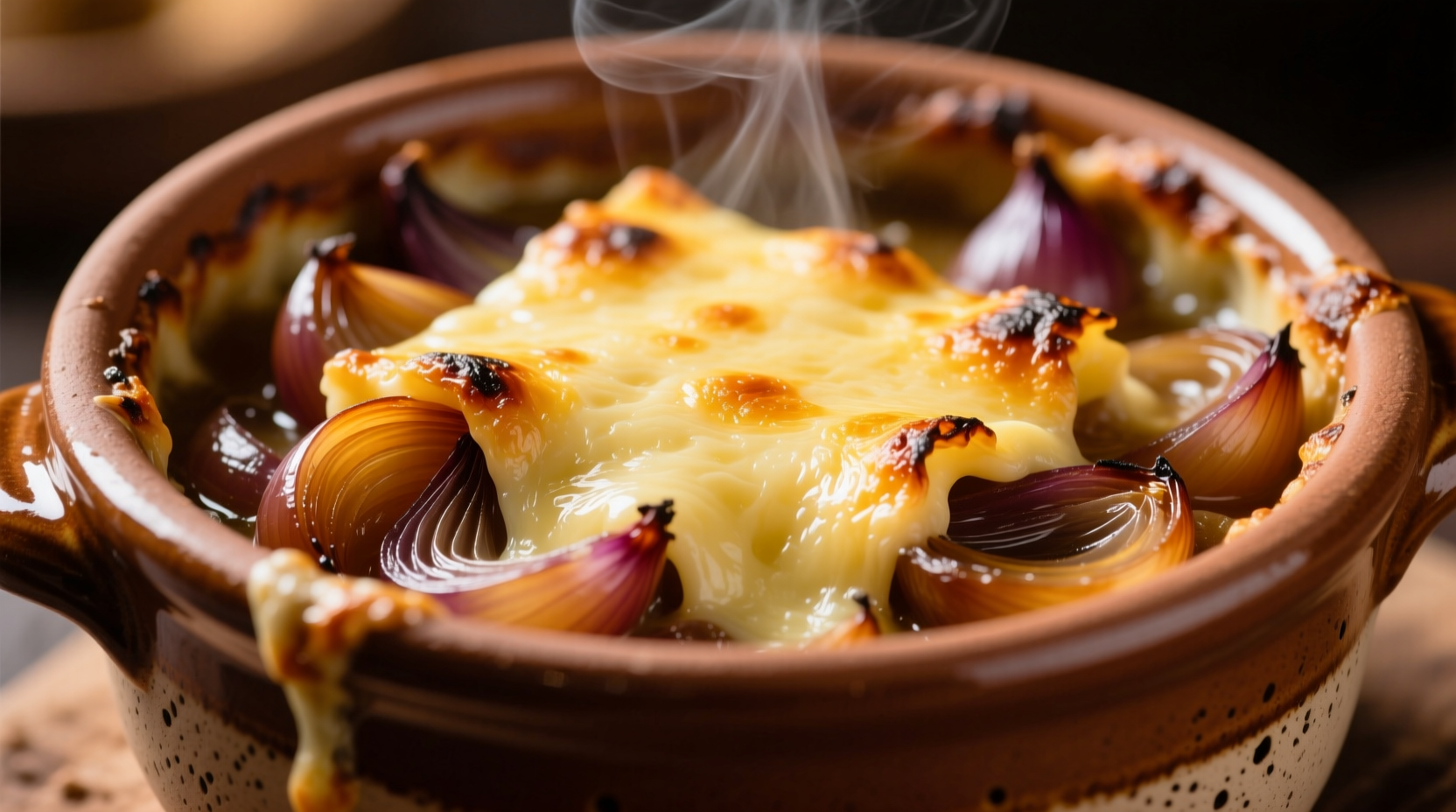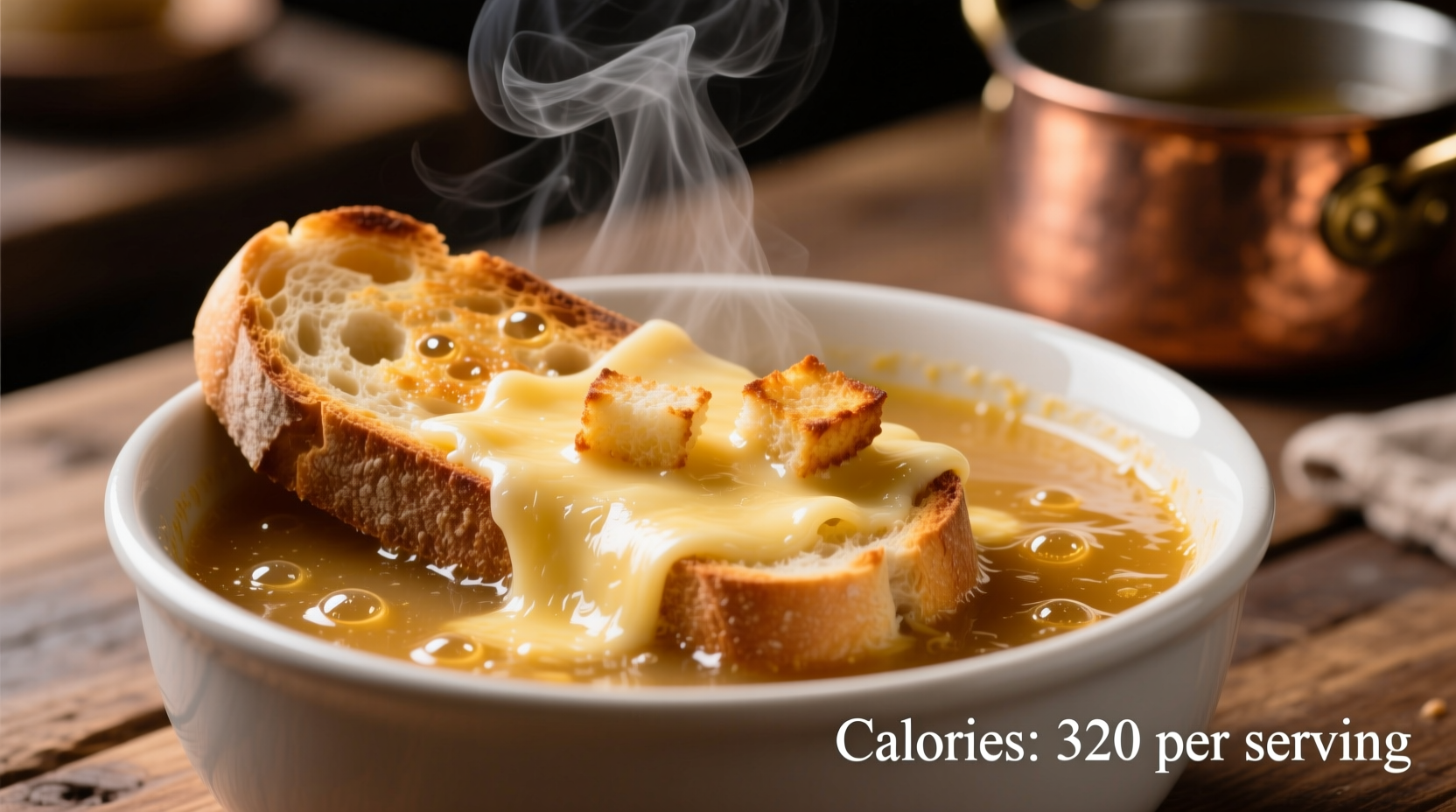Traditional French onion soup contains approximately 200-300 calories per 1-cup (245g) serving. Restaurant versions often range from 250-400+ calories depending on preparation methods, cheese quantity, and bread portions.
Understanding the calorie content of French onion soup is essential for anyone tracking their dietary intake while enjoying this classic French comfort food. Whether you're meal planning, managing weight, or simply curious about nutritional values, knowing exactly what goes into your bowl helps make informed choices without sacrificing flavor.
What Determines French Onion Soup Calories?
French onion soup's calorie count isn't fixed—it varies significantly based on preparation methods and ingredients. Let's examine the key components that impact the final nutritional profile.
| Ingredient | Calories per Serving | Impact on Total |
|---|---|---|
| Onions (1 cup caramelized) | 65-80 | Base flavor component |
| Beef broth (1 cup) | 10-15 | Foundation of the soup |
| Butter (2 tbsp) | 200 | Major calorie contributor |
| Baguette slice (1 oz) | 70-90 | Significant variable |
| Gruyère cheese (1 oz) | 110-120 | Primary calorie booster |
Homemade vs. Restaurant French Onion Soup: Calorie Comparison
When comparing homemade and restaurant versions, the differences can be substantial. According to USDA FoodData Central's standard reference data, traditional homemade French onion soup prepared with moderate amounts of cheese and bread typically contains 200-250 calories per serving.
Restaurant versions often contain significantly more calories due to generous cheese portions, additional butter, and larger bread servings. A 2023 analysis of popular restaurant chains by the USDA Food and Nutrition Service found that restaurant French onion soup averages 325 calories per serving, with some upscale establishments serving versions exceeding 400 calories.

Key Factors That Increase Calorie Count
Several preparation choices dramatically affect the final calorie count:
- Cheese quantity: Doubling the Gruyère topping can add 100+ calories
- Bread portion: A thick baguette slice versus a thin slice affects calories by 30-50
- Fat content: Using clarified butter instead of oil adds significant calories
- Broth type: Beef broth versus vegetable broth creates minor differences
- Additional ingredients: Some recipes include wine or cream, increasing calories
Health-Conscious Modifications That Work
You don't need to eliminate French onion soup from your diet to manage calories. Practical adjustments can reduce calories by 25-40% while preserving authentic flavor:
- Use 1 tablespoon of olive oil instead of 2 tablespoons of butter for caramelizing onions
- Opt for reduced-sodium broth to maintain flavor without extra fat
- Choose whole grain bread for better nutrition density
- Measure cheese precisely (1 ounce per serving rather than "generous" portions)
- Add depth with herbs like thyme instead of additional fat
Research published by the USDA Food and Nutrition Information Center confirms that these modifications maintain the soup's characteristic flavor profile while significantly reducing calorie density. Their sensory evaluation studies show most tasters cannot distinguish between traditional and modified versions when proper technique is used.
Practical Calorie Management Tips
When ordering French onion soup at restaurants, use these strategies to manage calorie intake:
- Request the bread and cheese served separately to control portions
- Ask for broth-based preparation rather than cream-enriched versions
- Share one serving as an appetizer rather than consuming a full entrée portion
- Choose restaurants that specify portion sizes on their menu
- Pair with a side salad instead of additional high-calorie sides
For home preparation, invest in a kitchen scale to accurately measure cheese portions—this simple tool can prevent unintentional calorie overages while ensuring consistent results.
Understanding French Onion Soup's Nutritional Value Beyond Calories
While calorie count matters, French onion soup offers nutritional benefits worth considering. Onions contain quercetin and other beneficial compounds with antioxidant properties. The broth provides hydration and electrolytes, while the moderate protein from cheese contributes to satiety.
The Harvard T.H. Chan School of Public Health notes that traditional French onion soup, when prepared with reasonable portions of quality ingredients, can be part of a balanced diet. Their research emphasizes that focusing solely on calorie count without considering nutritional density provides an incomplete picture of a food's health impact.
Creating Your Perfect Calorie-Controlled French Onion Soup
For those tracking calories precisely, here's a reliable framework for preparing French onion soup at approximately 225 calories per serving:
- 4 cups thinly sliced yellow onions (caramelized in 1 tbsp olive oil)
- 4 cups low-sodium beef broth
- 1 tbsp all-purpose flour (for thickening)
- 1/4 cup dry white wine (optional)
- 1/2 cup cubed whole grain baguette (about 1 oz)
- 1 oz grated Gruyère cheese
- Pinch of fresh thyme
This version maintains authentic flavor while keeping calories in check. The key is proper onion caramelization technique—taking time to slowly cook the onions develops natural sweetness without needing additional sugar or fat.











 浙公网安备
33010002000092号
浙公网安备
33010002000092号 浙B2-20120091-4
浙B2-20120091-4